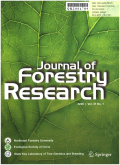- 钛学术文献服务平台 \
- 学术期刊 \
- 农业科学期刊 \
- 林业期刊 \
- 林业研究(英文版)期刊 \
null
Aboveground biomass allometric equations and distribution of carbon stocks of the African oak (Afzelia africana Sm.) in Burkina Faso
基本信息来源于合作网站,原文需代理用户跳转至来源网站获取
摘要:
The significant role of tropical forest ecosystems in the global carbon budget has increased the need for accurate estimates of tropical forest biomass.The lack of large-scale biomass allometric equations hampers the understanding of the spatial distribution of tree biomass and carbon stocks and their influencing factors in West Africa.This study aimed to develop allometric equations to estimate aboveground biomass of African oak (Afzelia africana Sm.) in Burkina Faso and to analyze factors affecting the variability of tree biomass and carbon storage.Sixty individual trees were destructively sampled in four protected areas along two climatic zones.In each climatic zone,log-log models were tested and fitted to each aboveground biomass component and to the total aboveground biomass.Carbon content in tree aboveground components was evaluated using the ash method.All validated equations showed good fit and performance with high explained variance.Allometric equations differed between the Sudano-sahelian zone and the Sudanian zone,except for leaf biomass equations.Both biomass allocation and carbon content varied significantly between tree components but not between climatic zones.Carbon content in tree components followed the patterns of biomass allocation with branches accounting for the highest proportion.In the two climatic zones,carbon contents were 50.18-52.62% for leaves,54.78-54.94% for stems and 54.96-55.99% for branches.Dry biomass ranged from 509.05 to 765.56 kg tree-1 at site level and from 620.21 to 624.48 kg tree-1 along climatic zones.Carbon content varied from 53.90% in the Sudano-sahelian zone to 54.39% in the Sudanian zone.This study indicated that climate does not influence aboveground biomass production and carbon sequestration of Afzelia africana along the Sudanosahelian and the Sudanian climatic zones of Burkina Faso.Future studies on climate-growth relationships should contribute to better understanding climate effects on biomass production and carbon storage.

推荐文章
期刊_丙丁烷TDLAS测量系统的吸收峰自动检测
带间级联激光器
调谐半导体激光吸收光谱
雾剂检漏 中红外吸收峰 洛伦兹光谱线型
不同盐度、温度及光照对漂浮浒苔生理生态的影响
浒苔
盐度
温度
光照
生理生态
期刊_联合空间信息的改进低秩稀疏矩阵分解的高光谱异常目标检测
高光谱图像
异常目标检测 低秩稀疏矩阵分解 稀疏矩阵 残差矩阵
内容分析
关键词云
关键词热度
相关文献总数
(/次)
(/年)
引文网络
引文网络
二级参考文献 (19)
共引文献 (2)
参考文献 (30)
节点文献
引证文献 (0)
同被引文献 (0)
二级引证文献 (0)
1965(1)
- 参考文献(0)
- 二级参考文献(1)
1968(1)
- 参考文献(0)
- 二级参考文献(1)
1989(2)
- 参考文献(0)
- 二级参考文献(2)
1990(1)
- 参考文献(0)
- 二级参考文献(1)
1993(1)
- 参考文献(0)
- 二级参考文献(1)
1994(1)
- 参考文献(0)
- 二级参考文献(1)
1995(1)
- 参考文献(0)
- 二级参考文献(1)
1997(1)
- 参考文献(0)
- 二级参考文献(1)
1998(1)
- 参考文献(0)
- 二级参考文献(1)
2001(1)
- 参考文献(0)
- 二级参考文献(1)
2002(1)
- 参考文献(0)
- 二级参考文献(1)
2003(1)
- 参考文献(1)
- 二级参考文献(0)
2004(1)
- 参考文献(0)
- 二级参考文献(1)
2005(3)
- 参考文献(1)
- 二级参考文献(2)
2006(1)
- 参考文献(0)
- 二级参考文献(1)
2007(1)
- 参考文献(1)
- 二级参考文献(0)
2008(2)
- 参考文献(0)
- 二级参考文献(2)
2009(2)
- 参考文献(1)
- 二级参考文献(1)
2010(3)
- 参考文献(3)
- 二级参考文献(0)
2011(2)
- 参考文献(2)
- 二级参考文献(0)
2012(2)
- 参考文献(2)
- 二级参考文献(0)
2013(2)
- 参考文献(2)
- 二级参考文献(0)
2014(2)
- 参考文献(2)
- 二级参考文献(0)
2015(2)
- 参考文献(2)
- 二级参考文献(0)
2016(6)
- 参考文献(6)
- 二级参考文献(0)
2017(4)
- 参考文献(4)
- 二级参考文献(0)
2018(2)
- 参考文献(2)
- 二级参考文献(0)
2019(1)
- 参考文献(1)
- 二级参考文献(0)
2020(0)
- 参考文献(0)
- 二级参考文献(0)
- 引证文献(0)
- 二级引证文献(0)
引文网络交叉学科
相关学者/机构
期刊影响力
林业研究(英文版)
主办单位:
东北林业大学
中国生态学学会
出版周期:
双月刊
ISSN:
1007-662X
CN:
23-1409/S
开本:
大16开
出版地:
哈尔滨市动力区和兴路26号(林大123信箱)
邮发代号:
创刊时间:
1990
语种:
eng
出版文献量(篇)
2459
总下载数(次)
1
总被引数(次)
7852
期刊文献
相关文献
推荐文献
- 期刊分类
- 期刊(年)
- 期刊(期)
- 期刊推荐
林业研究(英文版)2022
林业研究(英文版)2021
林业研究(英文版)2020
林业研究(英文版)2019
林业研究(英文版)2018
林业研究(英文版)2017
林业研究(英文版)2016
林业研究(英文版)2015
林业研究(英文版)2014
林业研究(英文版)2013
林业研究(英文版)2012
林业研究(英文版)2011
林业研究(英文版)2010
林业研究(英文版)2009
林业研究(英文版)2008
林业研究(英文版)2007
林业研究(英文版)2006
林业研究(英文版)2005
林业研究(英文版)2004
林业研究(英文版)2003
林业研究(英文版)2002
林业研究(英文版)2001
林业研究(英文版)2000
林业研究(英文版)1999
林业研究(英文版)2020年第6期
林业研究(英文版)2020年第5期
林业研究(英文版)2020年第4期
林业研究(英文版)2020年第3期
林业研究(英文版)2020年第2期
林业研究(英文版)2020年第1期

 免费查重
免费查重










